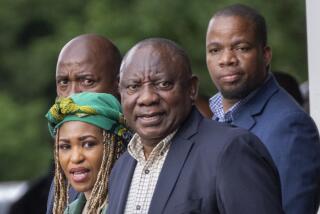Leabua Jonathan; Former Lesotho Prime Minister
- Share via
MASERU, Lesotho — Former Prime Minister Leabua Jonathan, who led this nation for 20 years before his ouster last year in a military coup, will be buried next week at his farm, his family has announced.
Jonathan, who ruled this tiny mountain kingdom surrounded by South Africa, was 73 when he died last Sunday of stomach cancer.
He had flown from Lesotho to South Africa two days earlier, reportedly en route to London for treatment, but was taken instead to the H. F. Verwoerd Hospital in Pretoria. Later he was transferred to the Little Company of Mary Hospital, where he died.
Survived by Wife, Daughters
Relatives said Jonathan will be buried April 18 at his large family farm in Kolonyma Ha Rakolo, 43 miles north of the capital. He is survived by his wife, Manthli, and three daughters.
Jonathan had been Lesotho’s only leader from 1966, when the predominantly black country gained independence from Britain, until the coup.
In the early years of his leadership, he maintained cordial relations with South Africa, which dominates Lesotho’s economy.
In 1970, Jonathan suspended the nation’s constitution when it appeared that he would lose scheduled elections. Thereafter he ruled autocratically over the country of 1.3 million people, repressing opposition parties and establishing a paramilitary youth league.
He gradually shifted against South Africa, speaking out against its apartheid policy of racial separation. He also endorsed African National Congress guerrillas battling the South African government and established ties with Soviet Bloc countries.
Blockade Imposed
In late 1985, South Africa claimed that Lesotho--which as Basutoland was granted British protection from the advancing Boers in 1868--had become a major base for anti-apartheid guerrillas and imposed a blockade that drastically reduced the flow of goods in and out of the country. The blockade was lifted after the January, 1986, coup.
The military government ordered scores of African National Congress members and supporters out of Lesotho, severed ties with North Korea and other Communist countries, and Jonathan and some of his aides were at one point placed under house arrest.
Maj. Gen. Justin Lekhanya became chairman of the military council following the coup.
More to Read
Sign up for Essential California
The most important California stories and recommendations in your inbox every morning.
You may occasionally receive promotional content from the Los Angeles Times.











